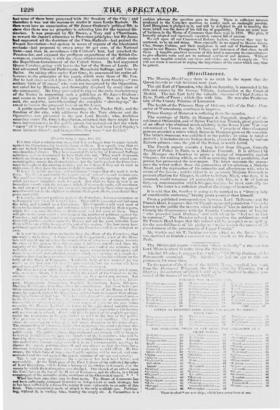Drp.,,111.e Glqsa , te .1r4pv, 00e. So.S It is true what a
eotemperary says, that it is no longer time to argue vaguely against the Corn-laws, Ian to s,eike home at them. It is equally trite that we are not to look for immediate a,-Istanee iu any a:ads against them from the uncufranchisol classes. Thee have mounted 1:!mir beldiv of Universal Suffrage agitation, cite determined to hare their ride out. They won't di.onottnt, whistle on them as cost may. It is by the friends of rational end sound com- mercial policy :111101V the electoral Masses that the battle against the Corn-laws must IsAlatglit in the ensuing se•-.sion : and sic II 'ices!, if they set to work iu right canoes, they have the means t, tight it successfully. It is nor pa Idir meetIng, till•I Letures that the work is to be done. We 11110,1Vahle .1!i:Itort;Ilet: or and instruments. We woul-1 cot ititirriipt or dehort from them. They are ripening the public mind. end into eitinsate`,:e work far good. 1.b.st what we have in view is an immediate v. rcstle with the which, it' vh!orott:ly made, vein overthrow it, foul yet n.re,1 not divert one vsnment-s attention from these other means of assault—Wel not in the slightest neutralixe their gold elrvets, even should they prove sueresshi!. It is uot he abstrret rtitbms tvrimt the Corn-law., however numerous or the' r'er work is to 1 e me. They he presented and laid upon the tattle, and referred to a Committee. The Commit-VT will acted most of them to the Ittuder-elobset, me! will on.os ' clr printed in their reports, which fee. • es save Parlimomt, mai filv even of them. They will give in tile same repa.; e sta.:meta of the number of petitions against the Corn-law :, awl el the number of si;matitres attached to them. 'These peti- tions will priv:11(•■• no erect ....ma the and MI the good derivable from than will 1,,, nine al ilily tic say, at tbs. eul of the session, " See how many have vetitioned vpilest the Own-I...vs." Bit the Corn-last will be as stringent as ever.
It is not by a Commi.tee hi :e^• :-•• into the effects of the Corn-laws that the work is to Et. a ill 1 appointed ; a few of the Mem- .burs is ill tend day aft..: day :1 • • a: perhaps., towards the close 441. '14C,444.41). '• oc a +,1 report ; and. then the majority of the :Members, Ill,. I d. hear icurd of the evidence, will rush inn, tI c C.•motittes.sr.11,1,1 1'4, .4 44. tic Ile ; will 0111,1, a!141. ' • 11:411 4.kolling, or a simple do- elarati.eec that trey hoe e is •-, .•, lay the evidence on the table of the ifottce of (' .• ,• :y of raw materi..l for the st-ati-' or fte bisr, eirn ! ' ; Milt the session w1:1 have , 71. 1,4, ever.
!.d vieoronsly acted upon, the t'orn-laws, in the never VIM recover. Let - in Liorilno.
Leeils, (lhisgoo, Let these ,,f she I • ionlo: of mercantile
;In* the year before uml constituents.— fora fiir hearing m tiw. explicit quest-hi:, „ the time of the
'ii,
where tii.. . •I 1,1 Hie The exami:, m' !I • —t rvitt-total ! !•,.!•-• •••••• evils it . ripen the public e•ise. •. i iIL thus ebb alsenbel anA 1 -.'i'l, will be brought
to Ler la 1.- , ; .1.stbaltsts of the "-datum, who will he
*form d e•t.' - ilet in a straiglitfore.;ii•il mec.,mcr. Around this celitr.,1 att.: 1:—.7011,- is it as to a centre—ptililic meetings to
disenss the et'ejset, petititMs mei any classes the Corti-laws, passed ore.... :mil • But flier, is tt Peen will, we f. -el e.• thdettr, '
enettimr • ;:i,,•• • • stuitc tte t •
iliratin4;e1a,.
titiuu tb.•. simaltme.a.its:y fer
molls, by ....no • t! • '• •
tions t, w s I. ne. r • • • ..••1:. in tai.,,':•• — •
tress•----10, • •!.• ,l.—with 5: • T:
with a •s -
-will not erre o ought the t "-eft The pr.s•:-' et cushion whereon the question goes to sleep. There is sufficient taterest awakened in the Corn-law question to render such an onslaught prissible. Lord ;brougham is pledged to it, and will be delighted to aid in reacting the scene Svhich was the dawn of his full day of' popularity. There arc more men of business in the Houk of Commons than there were iu ISM. This plan, if honestly adopted and vigorously executed, cannot fail of success.
We call upon all our Commercial Reform leaders, wherever they may be scattered, to be up and doing. More especially do we appeal to Messrs. Grote, Clay, Sturge, Cobden, and their coadjutors in and out of Parliament, We appeal to our Humes, Thompsons, Villiers, and statesmen of that class, to Aid them. A tangible practical measure of this kind is necessary to concentrate— to give effective voice and act to national sentiment and opinion. 'Without sonic such tangible symbol, our views and wishes are lost in cmety air. We will not waste a moment in urging the importance of the cause which may thus be gained.


























 Previous page
Previous page